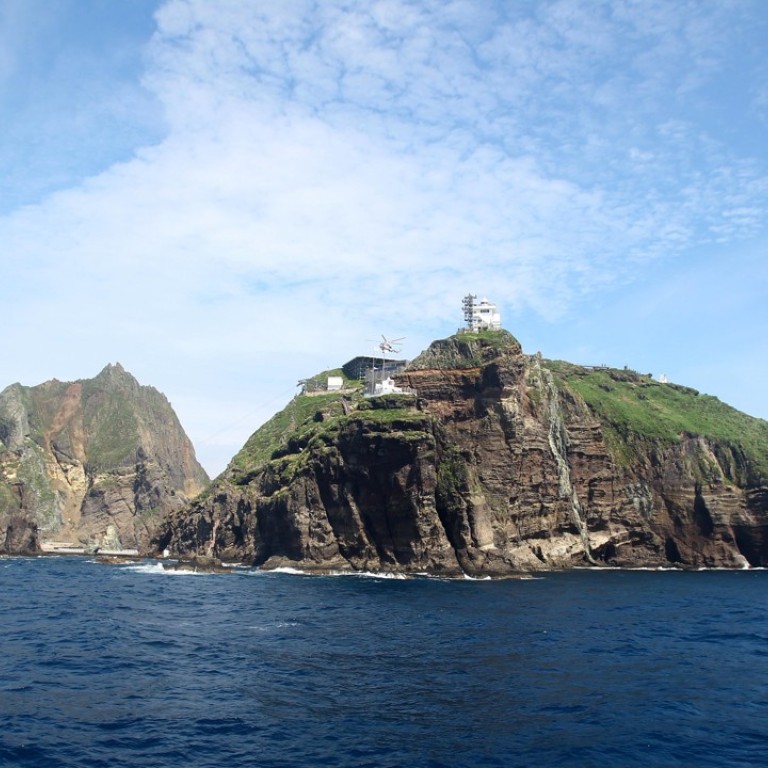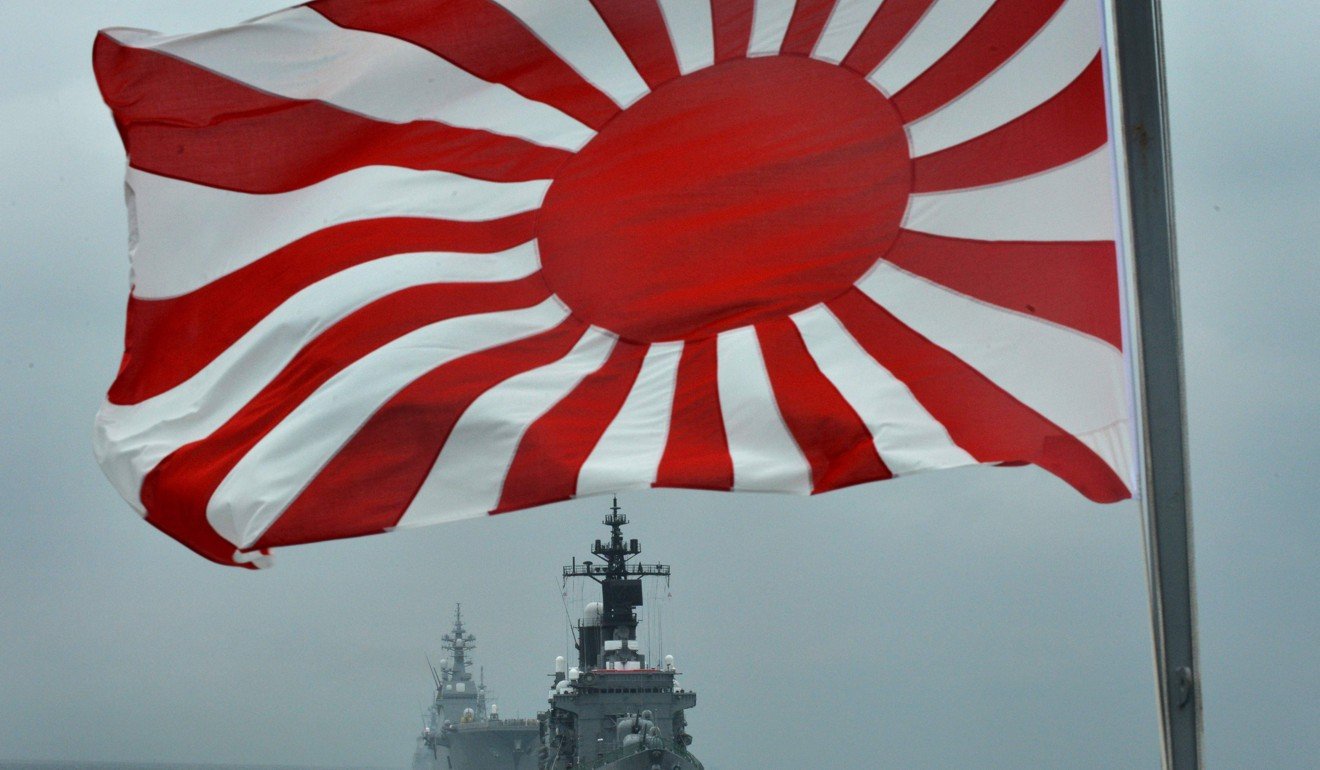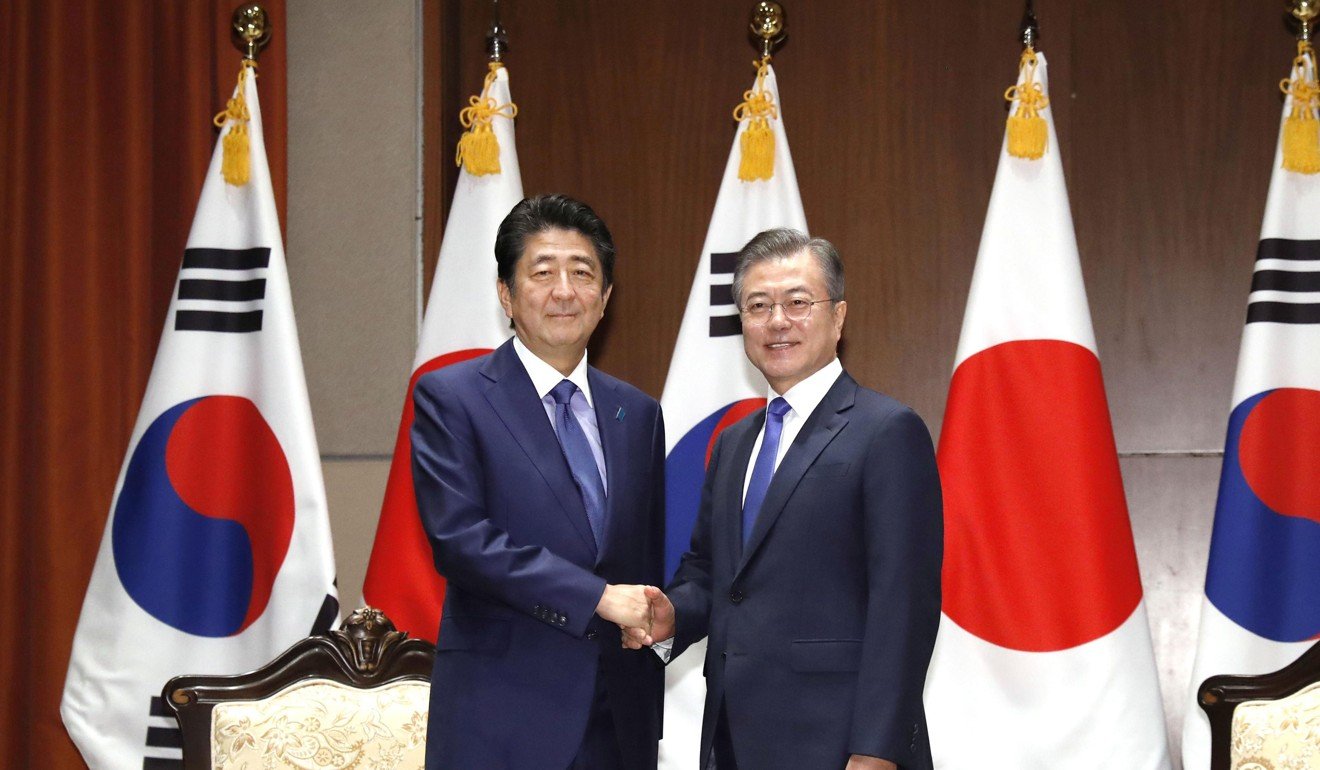
Japan-South Korea ties: on the rocks over Pyongyang?
- Nationalistic posturing by 13 South Korean politicians on a rocky outcrop in the Sea of Japan is seen as the latest attempt to antagonise Tokyo.
- But observers say the long-term goal of this behaviour is to curry favour with North Korea
On Monday, a group of 13 South Korean politicians unfurled their national flag on the top of a rocky outcrop in the Sea of Japan that is controlled by Seoul but claimed by Tokyo as its sovereign territory. Known as Dok-do in Korea, the inhospitable rocks are home to a detachment of police and are visited by boatloads of tourists. The islands appear on Japanese maps as Takeshima.
South Korea kicks off naval showcase without Japan after row over controversial ‘Rising Sun’ flag
The Japanese government had used diplomatic channels to urge the politicians not to undertake the trip before they left, in order not to provoke a new dispute, but that request was ignored.
Tokyo subsequently lodged an official complaint with Seoul, with chief cabinet secretary Yoshihide Suga telling reporters that “this Takeshima visit by the politicians was utterly unacceptable in light of our country’s position on the sovereignty of Takeshima”.
The latest point of contention between the two governments came after Moon suggested his administration would abolish a foundation set up in 2015 as part of a “final and irreversible” agreement between Japan and Park Geun-hye, Moon’s predecessor in the presidential Blue House, to draw a line under the controversy of women forced to serve in brothels for the Japanese military before and during the second world war.

Seoul has also opened a research institute charged with gathering documentary evidence about the sex slaves and unveiled a new statue in honour of the victims.
There is also a lingering bad taste in Japan over a row earlier this month in which a Japanese Maritime Self-Defence Force warship was forced to withdraw from an international naval review off South Korea’s Jeju island after Tokyo refused to lower the controversial “rising sun” flag that is still the official ensign of the Japanese navy.
That anger was heightened when, despite assurances that no other nations would be flying their naval ensigns, vessels of seven navies taking part in the event did so. The South Korean navy also failed to meet that commitment, flying a yellow-and-black ensign that is said to have been used by Admiral Yi Sun-sin, the 16th-century Korean commander who defeated Japanese troops headed by Toyotomi Hideyoshi when they invaded Korea in the 16th century.
Japan’s conservatives cry bias as UN committee takes Tokyo to task over wartime ‘comfort women’
“Individually and all taken together, it’s very provocative,” said Yoichi Shimada, a professor of international relations at Fukui Prefectural University.
“The Moon administration has a policy of engagement towards the North that has essentially left Japan and the United States as the only governments that are still standing strong on sanctions as we try to force Pyongyang to give up its nuclear weapons,” he said.
“By bringing up historical issues, the South is trying to cement its relations with the North at the expense of Japan when, in reality, we should be working together to reduce the threat that Pyongyang poses to all of us.”

Shimada dismissed the visit by South Korean politicians to Dok-do – “It was a stunt and they are unknowns in the South’s political world” – and said members of the parliament in Seoul need to realise who their real enemy is.
“Virtually all South Korean politicians lack the basic courage to say the truth,” he said. “They are more interested in scoring cheap political points by going to Takeshima [Dok-do] than confronting the real problem.
“The Moon administration is practising outright appeasement towards Pyongyang; that is the most important thing and it puts Japan and the rest of the world in danger.”
#MeToo is too slow in Japan as peeping toms come under the spotlight
Relations between the two nations are likely to worsen further next week as South Korea’s Supreme Court is expected to announce on October 30 a ruling in a damages lawsuit brought against Nippon Steel & Sumitomo Metal Corporation by four people who claim they were forced to labour for the company during the years of Japan’s colonial rule.
Japan has consistently taken the position that all issues relating to claims were settled under an agreement that formed the basis of the normalisation of diplomatic relations in 1965.
A lower court in 2013 sided with the plaintiffs and ordered the Japanese company to pay each of them 100 million won (US$88,047) in compensation. Should the Supreme Court uphold that ruling, it could lead to a flood of similar claims against Japanese companies and further damage diplomatic ties.

